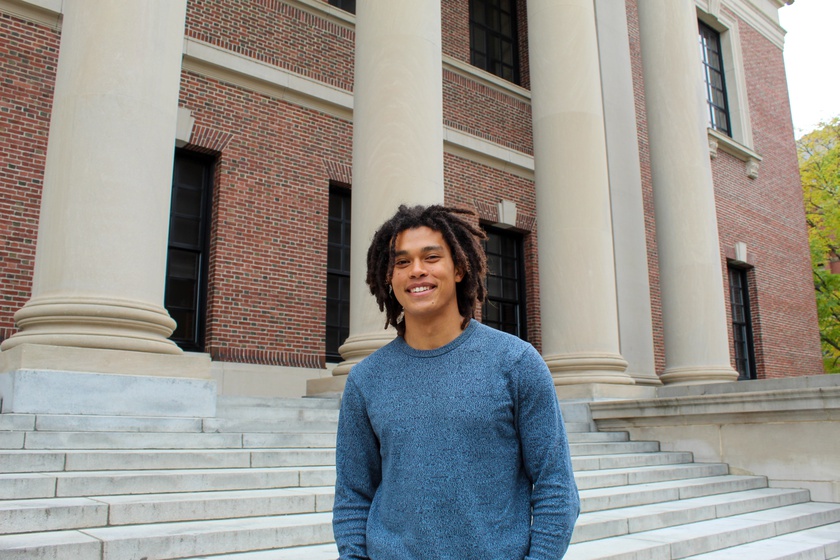{shortcode-f970082543f999c3fe28e0e60a6e2033e00d3ce2}
{shortcode-69a9ed06c887cb075e6988b5c6d61980cc21c96c}icah I. Williams ’24 is probably easier to make plans with than anyone I’ve ever met. “I spend most of my free time in my room these days. Lots of sunlight,” he writes in response to my email inquiry. “There’s also a spot at Fresh Pond where I really like to sit in the afternoons. Sunset on Weeks Bridge is cool too.” It’s like emailing a cat.
We meet up at Fresh Pond on a gray Friday afternoon. When I get there, Micah is plucking out scales on a mandolin, wearing black Converse high tops, a black North Face jacket, and a heathered blue-gray sweater. I apologize for being late, but whatever, no rush. “I was here yesterday, I’ll probably be here tomorrow,” he tells me.
Micah comes to Fresh Pond all the time to just sit on the benches — right now, he’s leaning back at a 45-degree angle, using his hands for support — and he bikes to the North End once a week, hanging out in the bakeries, coffee shops, and fruit market. During our conversation, he spends two whole minutes describing the best pizza places in Boston (first place: Galleria Umberto) and another two making the case against the New York dollar slice (they churn them out too fast).
His long-term dream in life is to build a pizza oven. Maybe also to build a house with a huge greenhouse and spend four or five hours a day making soup; good food can be a life-changing experience. Once, Micah was out collecting insects for class and saw grapes growing on a vine nearby. “I ate this grape and my whole world just stopped,” he says, comparing it to the scene in “Ratatouille” when Remy tries strawberries and cheese for the first time, fireworks exploding overhead.
“I’m chasing that feeling. That’s what I want to get to all the time,” Micah says. “You’ve got to push back on this commodification and industrialization stuff to be able to get there.”
Once we start talking about the industry, Micah leans forward so he can gesture with his hands. He has a startup called Anonymous Foods that aims to make food production supply chains “radically transparent.” For this project, Micah has traveled to chocolate factories in San Francisco and goat cheese farms outside of Worcester; he blogs about his process on LinkedIn. In addition to his love of cooking, he says the project was inspired by growing up in Hawaii, where around 85 percent of food is imported.
As we talk about the pitfalls of fair trade and direct trade labels, the mandolin next to us catches my eye. Micah says he likes to play songs by Watchhouse and Gregory Alan Isakov. Sometimes he jams with his roommate, who plays banjo, sitting in front of their dorm window and watching the sun go down over the Charles.
I ask if it’s easier to learn if you can already play guitar. “Do you want to try?” he says, handing it over. Turns out the knowledge does not transfer, but whatever, we have time. He shows me how to balance the instrument in my lap and how the strings are tuned.
Although spending time like this is probably why he was crowned Most Chill, Micah doesn’t really agree with the title. “There are some things that I’m super intense about,” he says, laughing. “My friends like to joke with me about it, like, ‘Here he goes talking about roads again.’”
Looking down from his room in Dunster, as your eyes catch the sunset, you also have to look down at Memorial Drive. It’s hard to ignore that there’s something “seriously wrong” with how American cities are designed, Micah says: Memorial Drive is noisy, increases pollution, and cuts people off from the river. This year, after locals signed petitions and organized protests to keep the road closed for full weekends, which the Cambridge City Council voted in favor of, the state opened it back up to traffic on Saturdays anyway.
“What would it look like if we tried something different?” Micah says. “If we tried something a little more extreme, or a little more disruptive?” He asks if I’ve read the book “How to Blow Up a Pipeline,” by the climate scholar Andreas Malm, who argues that we have a moral obligation to sabotage fossil fuel infrastructure. (To be clear, Micah says he does not advocate for, say, blowing up Monsanto.)
So maybe it’s time to rethink chillness altogether. Chillness is selective, exonymic, and probably not even real; more importantly, whatever it is, it’s a process. During Micah’s freshman year, the pandemic sent everyone home in the middle of winter, and he ended up taking a year off. “My sophomore year, I came back and I got through winter,” he says. “And then I got to spring and I saw everything come alive again. I was like, ‘Whoa, I get it now.’”
“Some people say you can maximize luck, you know, you can put yourself in a position to be lucky,” Micah adds. “I think the same thing is true for happiness. You can put yourself in a position to be happy.”
He laughs, gazing out at the water. “Maybe chill is a good word for it and maybe it isn’t.”
— Associate Magazine Editor Bea Wall-Feng can be reached at bea.wall-feng@thecrimson.com. Follow her @wallfeng.


